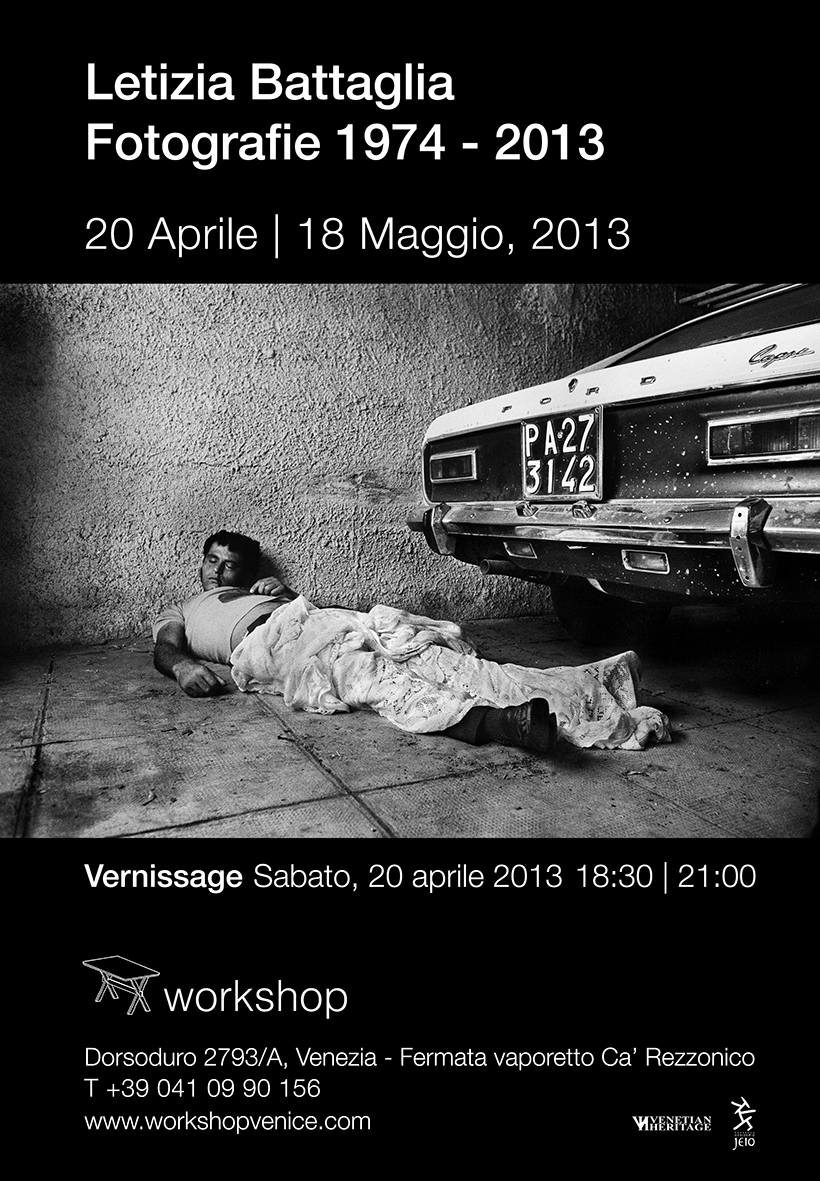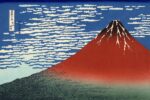Letizia Battaglia – Fotografie 1974-2013

La mostra è divisa in tre parti ben distinte, Cronaca, Rielaborazioni e Gli Invincibili. La mostra consiste in un viaggio attraverso un spaccato sociale della storia Italiana visto dall’obbiettivo della macchina fotografica di Letizia Battaglia.
Comunicato stampa
Workshop is delighted to announce the opening of ʻFotografie 1974-2013ʼ, a retrospective exhibition of work by Letizia Battaglia and her first in Venice. The exhibition will run from 20 April until 18 May 2013.
Fotografie 1974 - 2013 is divided into three distinct sections, Cronaca, Rielaborazioni and Gli Invincibili, a panorama of Italian life spanning the past thirty years.
Cronaca (Reportage)
ʻItʼs been quite some time but these are still the images that disturb me the most. Whilst choosing the photographs for this exhibition, I realise that Iʼve forgotten those of Giovanni Falcone. He should never be absent. As I think of him, I remember the date of the anniversary of his death, the 23rd May. It was a beautiful spring afternoon. Giovanni Falcone was returning from Rome with his wife Francesca and his bodyguards, Vito Schifani, Antonino Montinaro and Rocco Dicillo, as I sat watching a documentary on the television with my mother, her hands in mine. I would usually go to see him of a Sunday afternoon but that day for some reason, I was unable to do so. Suddenly my programme was interrupted by the news that something had happened to Falcone on the motorway. We were unable to move for a few seconds, then panic hit me. I just lost it. The only thing I could do was to telephone my studio to warn Franco and Shobha. I wasnʼt about to go to the motorway, in fact I was never again to take photographs of the dead.'
Rielaborazioni (Reworkings)
ʻI often dreamed of burning my negatives during the 70s, 80s and even into the early years of the 90s. Out of disgust really, or out of desperation. I just wanted to get all that was foul about Palermo out of my sight. One day in 2004 as I was examining a large photograph it came to me in a shot. I could change it. That is to say, I could make it into something else, I could give it a new life. So, from 2004 were born Le Rielaborazioni and I started to turn my reportage shots into something different. I still use these old shots today, but only as the background to something else, no longer as the primary image.'
Gli Invincibili (The Invincibles)
ʻFour works from those produced in 2013, never exhibited and never before seen of Pier Paolo Pasolini,
Rosa Parks, Il Crocifisso di Santo Spirito, 1493, di Michelangelo and Giovanni Falcone e Paolo Borsellino. No further explanation required.'
Letizia Battaglia, Palermo, March 2013.
Letizia Battaglia was born in Palermo, Sicily in 1935. Married at 16, she took up photojournalism after her divorce in 1971, while raising three daughters. She picked up a camera when she found that she could better sell her articles if they were accompanied by photographs and slowly discovered a burning
passion for photography. In 1974, after a period in Milan, she returned to Sicily to work for the LʼOra newspaper until it was forced to close in 1990. Battaglia took some 600,000 images as she covered the territory for the paper. 'I realised that I had taken photographs of just about everything I could have done, in Palermo. Even football matches. But most of all I took pictures of misery, of dead bodies, of those being arrested, of bombs, of court cases, of litter, of the wounded, of fascists, of children, of women, of demonstrations and of the humiliated.' Over the years she documented the ferocious internal war of the Mafia, and its assault on civil society. Battaglia sometimes found herself at the scene of four or five different murders in a single day. Battaglia and Franco Zecchin produced many of the iconic images that have come to represent Sicily and the Mafia throughout the world. She photographed the dead so often that she was like a roving morgue. "Suddenly," she once said, "I had an archive of blood."
Battaglia also became involved in women's and environmental issues. For several years she stopped taking pictures and officially entered the world of politics. From 1985 to 1997 she held a seat on the Palermo city council for the Green Party. She was instrumental in saving and reviving the historic center
of Palermo. For a time she ran a publishing house, Edizioni della Battaglia, and co-founded a monthly journal for women, Mezzocielo. She is deeply involved in working for the rights of women and, most recently, of prisoners. In 1993, when prosecutors in Palermo indicted Giulio Andreotti, who had been
prime minister of Italy seven times, the police searched Battaglia's archives and found two 1979 photographs of Andreotti with Nino Salvo, a prominent mafioso, he had denied knowing. Aside from the accounts of i pentiti, these pictures were the only physical evidence of this powerful politician's connections to the Sicilian Mafia. Battaglia herself had forgotten having taken the photograph. Its potential significance was apparent only 15 years after it was taken.
In 1985 she received the W. Eugene Smith Grant in Humanistic Photography and then in 1999 she received the Photography Lifetime Achievement of the Mother Jones International Fund for Documentary Photography. In 2007 she received the Erich Salomon-Preis, a 'lifetime achievement' award of the Deutschen Gesellschaft für Photographie (DGPh) and the most prestigious prize in
Germany. In 2009, she was given the Cornell Capa Infinity Award by the International Center of Photography. In 2005, she appeared in the documentary Excellent Cadavers based on the
1995 book by Alexander Stille. She also has a cameo appearance in the 2008 Wim Wenders film Palermo Shooting.
Workshop is located at Dorsoduro 2793/A at Ca' Rezzonico in Venice. For further information or images please contact Michela Bruzzo at +39 041 099 0156 or [email protected].
SAVE THE DATE Diana Al-Hadid and Medardo Rosso
Opening Reception May 30, 2013 18.00 - 21.00
Workshop è lieta di presentare ‘Fotografie 1974 – 2013’ una retrospettiva di Letizia Battaglia, la sua prima personale a Venezia. La mostra sarà aperta al pubblico dal 20 di Aprile al 18 Maggio 2013.
La mostra è divisa in tre parti ben distinte, Cronaca, Rielaborazioni e Gli Invincibili. La mostra consiste in un viaggio attraverso un spaccato sociale della storia Italiana visto dall’obbiettivo della macchina fotografica di Letizia Battaglia.
Cronaca
‘Sono trascorsi tanti anni . Eppure nonostante gli anni quelle immagini sono ancora qui a turbarmi.
Seleziono le fotografie per questa esposizione. Avevo dimenticato di scegliere quella con Giovanni Falcone. Lui ci deve essere sempre nei libri, nelle mostre. Voglio sempre che venga ricordato anche al di fuori dell’anniversario del 23 maggio. Ogni volta che seleziono è il solito estenuante rito, indebolito dalla solita nausea. Questa sì, certo. Il giudice Terranova, sì, ci deve essere. E il boss Bagarella con lo sguardo truce che mi diede un calcio a foto già scattata, questa non deve mancare.
Quel 23 Maggio, era un bel pomeriggio di primavera, Giovanni Falcone stava tornando da Roma con la moglie Francesca e gli agenti di scorta Vito Schifani, Antonino Montinaro e Rocco Dicillo, mentre io tenevo, tra le mie, la bianca e morbida mano della mia mamma, guardando un documentario in TV. In genere andavo a trovarla la domenica pomeriggio, ma quella volta non avrei potuto. Ad un certo punto si interruppe il programma per comunicare che era successo qualcosa a Falcone in autostrada. Rimanemmo immobili per qualche secondo, il panico mi prese, non capii veramente più niente. L’unica cosa che seppi fare fu di telefonare in studio e di avvertire Franco e Shobha. Io no, io non sarei andata in autostrada, mai più sarei andata a fotografare i morti e tutto il resto.'
Rielaborazioni
‘Ho sognato spesso di bruciare i miei negativi della cronaca degli anni 70, 80 e un po’ di novanta. Per disgusto, forse per disperazione. Per annullare dalla mia vista lo schifo che aveva vissuto Palermo.
Un giorno del 2004 mentre stavo guardando con rabbia e tristezza una grande foto di una madre e tre figli poveri, coricati a letto perennemente per il freddo e per la fame, mi venne come un guizzo. Io queste foto, quelle che girano per il mondo, potevo distruggerle. Cioè potevo farle diventare altro: una vita, un corpo nudo, un sorriso mescolato alla foto di cronaca. Così dal 2004 sono nate le Rielaborazioni. Rielaborando le mie foto di cronaca nera in modo diverso. Ancora oggi le uso come fondali di altre foto, non più protagoniste.'
Gli Invincibili
'Quattro lavori tra quelli realizzati nel 2013, mai esposti e visti:
Pier Paolo Pasolini, Rosa Parks, Il Crocifisso di Santo Spirito, 1493, di Michelangelo, Giovanni Falcone e Paolo Borsellino. Questi nomi non necessitano ulteriore spiegazione, parlano da sè.'
Letizia Battaglia è nata a Palermo nel 1935. Dal 1974 (sino al 1991) è fotografa e direttrice del team fotografico del quotidiano L'Ora di Palermo.
E' la prima donna europea a ricevere, a New York, nel 1985 ‘Il Premio Eugene Smith per la fotografia sociale’ e a San Francisco, nel 1999, ‘The Mother Jones Achievement for Life’ . Nel 2007 in Germania la società tedesca di fotografia le assegna ‘The Erich Salomon Prize’. Nel maggio 2009 a New York viene premiata con il ‘Cornell Capa Infinity Award’. Oggi le sue immagini vengono esposte in tutto il mondo.
E' cofondatrice nel 1980 del centro di documentazione ‘Giuseppe Impastato’. E' regista, ambientalista, editore delle Edizioni della Battaglia, assessore dei Verdi con la giunta di Leoluca Orlando negli anni della Primavera Siciliana, deputata all'Assemblea Regionale Siciliana. Direttrice ed editore dellà rivista Gràndevù dal 1986. Fondatrice nel 1991 della rivista Mezzocielo, bimestrale realizzato da sole donne. Nella lista delle 1000 donne segnalate per il Nobel per la pace, nominata dal ‘Peace Women Across the Globe’.



